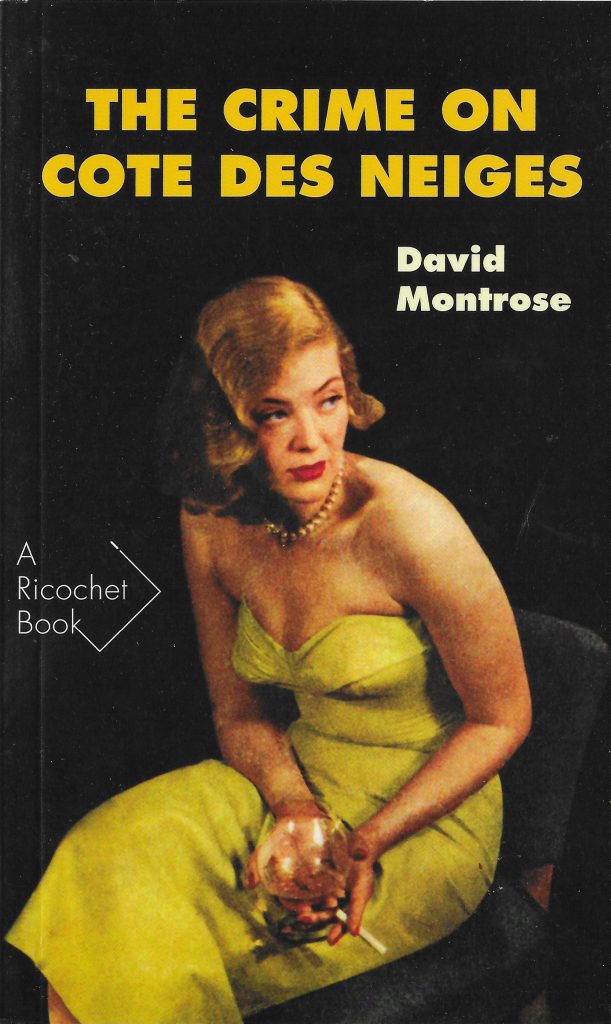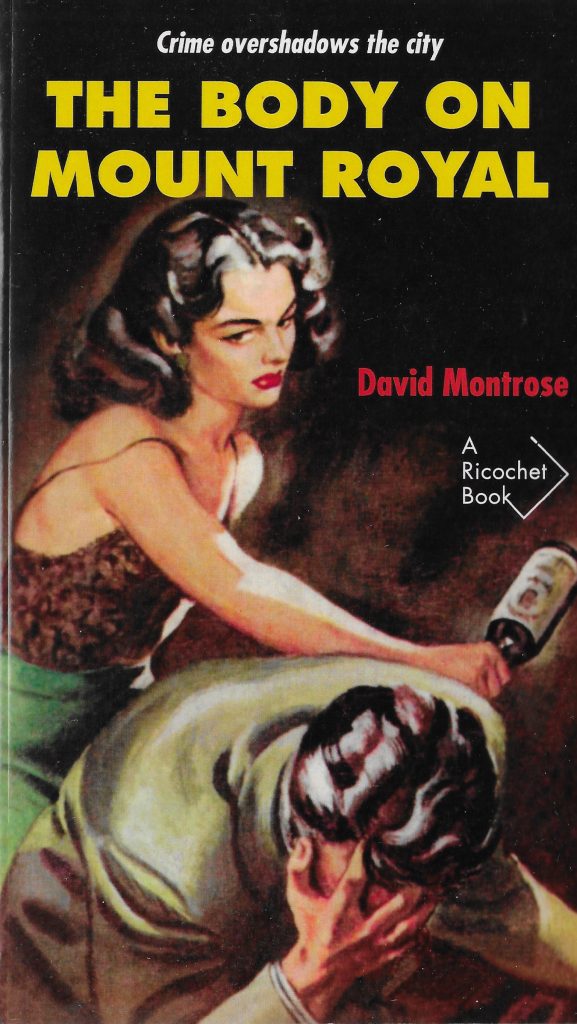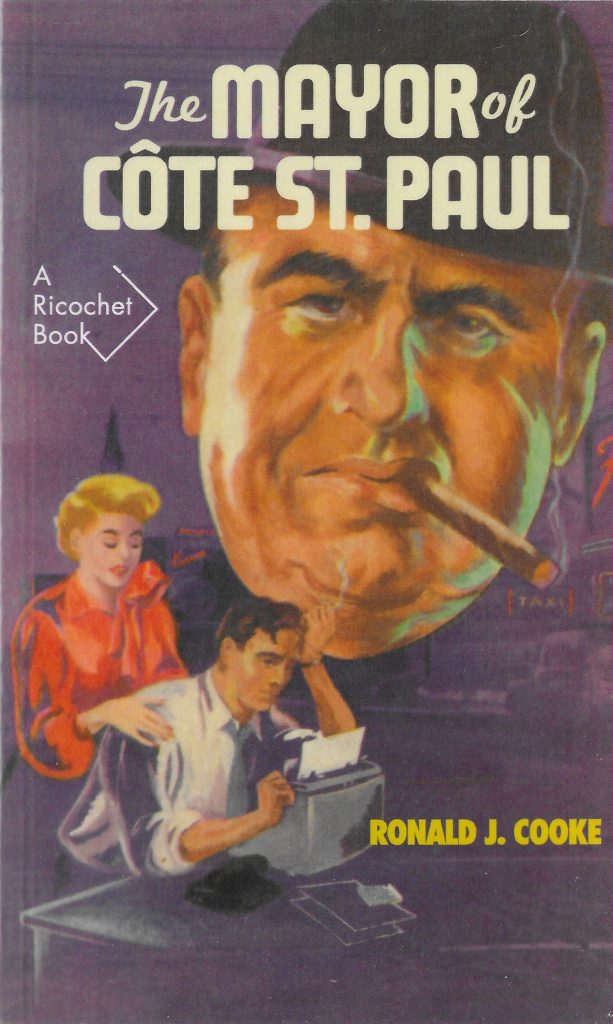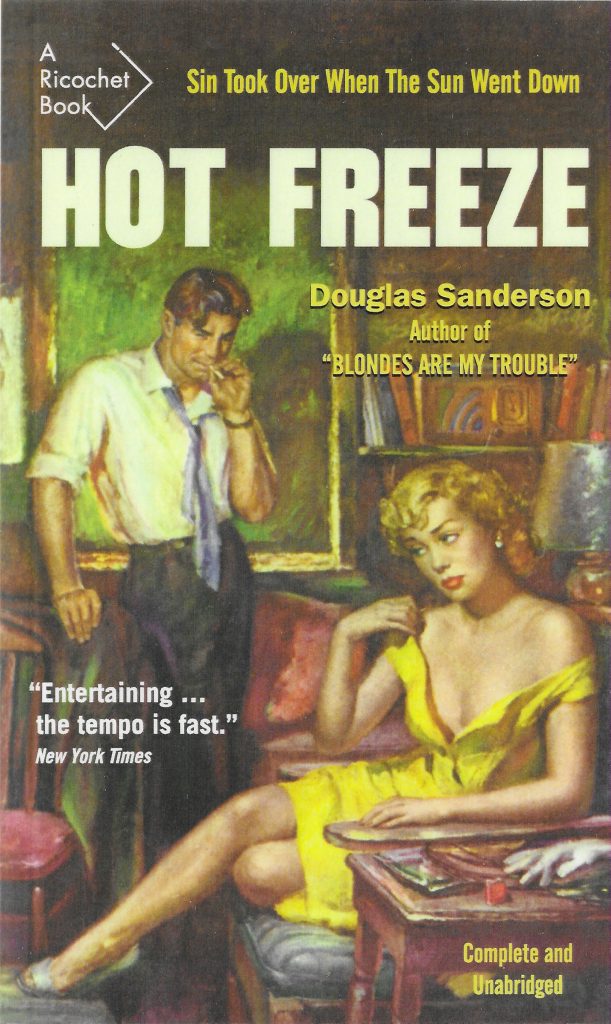Ricochet Books republishes vintage Montreal mysteries
by Emily Mernin
“It’s been a joy for me, I do the fun stuff,” says Brian Busby, the series editor of Ricochet Books, describing his editorial process. Joy is everywhere in the vision and history of Ricochet, an imprint of Véhicule Press dedicated to republishing vintage, out-of-print Canadian mystery novels. The imprint’s playful love of lurid paperbacks and Montreal-based noir yields bright, vivified editions with their original covers refurbished for publication.
So far, the majority of Ricochet’s books have been drawn from the lively slew of pulp fiction paperbacks published in the two decades after the Second World War. Both Busby and Simon Dardick, co-publisher at Véhicule, had been collecting postwar-era paperbacks for years before working together. After they discovered their shared delight in the genre, Ricochet Books came together naturally. Their inaugural novel, The Crime on Côte des Neiges by David Montrose, was republished in 2010. The story follows a private detective as he investigates the murder of a notorious bootlegger, hoping to clear the name of the prime suspect: the victim’s sultry wife. Since then, Ricochet has put out sixteen fast-paced pulps that range from hardboiled detective novels to scintillating accounts of organized crime.
What all the books have in common, aside from an incandescent, ever-closer underworld, is that they have been out of print for decades. By the mid-1960s, presses publishing pulp fiction had either shifted gears, narrowing their focus to other genres, or died altogether.
“The thing I find invaluable about the series is that we’re bringing things back into print that didn’t have a long shelf life,” says Busby, reflecting on the ephemeral nature of mass-produced paperbacks. “They were a kind of disposable literature that were cheaply printed in huge print runs, but just as they would appear on the edge of the rack for a month, they would be gone. That would be it.”
Ricochet does more than bring back narratives lost to time. Its editions are designed to invoke the originals and pay complete tribute to their objecthood; when discovered, it seems as though they were lifted from the smutty spinner rack in a 1950s drug store and sneaked onto a shelf of contemporary literary fiction. That’s not by coincidence: from the outset, Ricochet’s team has carefully considered what it means to bring a book, in its entirety – as a story, an ideological vehicle, an historical object – back to life.
The original texts and titles remain untouched, even though postwar era pulps often have more than a twinge of unsavoury tropes, ones that might not survive a contemporary editorial process. Instead of editing down the unpalatable (or downright offensive) bits of these crime-driven, hypermasculine yarns, Ricochet focuses on well-researched critical introductions from editors, historians, and even family members of the authors. The outcome is a series of books that not only expand the archive of Canadian pulp fiction, but comment on the historical image of urban life in postwar Canada, especially in Montreal and Toronto where most of the novels are set.
Noir detective novels are defined by moral ambiguity, darkness, and disturbed characters. In the late 1940s and 50s, Montreal was notorious for a similar bent: widespread debauchery and corruption. A vibrant arts and music scene followed suit, swelling in the hotbed of crime. Busby explains that pulp novels “captured a Montreal that was certainly present, but not necessarily present in the Anglo Montreal fiction of the time.” A city blooming in its underbelly, it became a muse for Canadian writers, many of whom would take a pen name to explore its shadows. Much like the cover-bound buxom blondes the genre is known for, pulp fiction writers placed Montreal locales in their titles as indicators for sex and sin.
Quite a few Ricochet editions, like The Body on Mount Royal and The Mayor of Côte St. Paul, are telling examples. In most of Ricochet’s novels, darkness is not confined to Montreal nightclubs and brothels but infiltrates all spheres of society, from the government to the domestic. One of Busby’s favourites, Hot Freeze, is described as “moving from the highest Westmount mansion to the lowest Montreal gambling joint.” And though Busby laments the lack of noirs set in other parts of Canada (“I’d love a prairie novel, or something set in Halifax”), it’s no surprise, given its postwar reputation, that Montreal is the unofficial home of this genre in Canada.
Véhicule Press has been a mainstay of Quebec’s literary community since the 1970s and is well known for its contemporary literary fiction and poetry. The press is also committed to promoting emerging writers, translated texts, and books that focus on Quebec’s culture. As part of Véhicule, Ricochet Books has found a strong readership that ranges from local bibliophiles and historians to international pulp enthusiasts. Looking ahead, Ricochet will continue to provide its audience with rare titles. Two of Ricochet’s forthcoming books, much to Busby’s excitement, will be firsts for the imprint: Perilous Passage takes place on the west coast, while another is set between both Toronto and Montreal.
To ricochet is not simply to return, but to bounce multiple times off the same surface. With this image always overhead, each edition of Ricochet Books reminds us that reading can be an act of play, of meddling with temporality, and a thrill ride on the coattails of a bygone imagination.
Emily Mernin is a writer based in Montreal.



